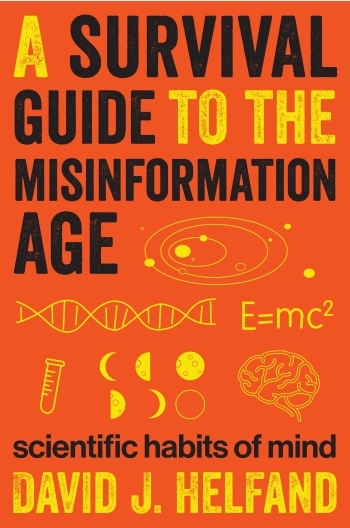David J. Helfand on Surviving the Misinformation Age
“The virtually unlimited power of the Internet to propagate such faulty information has launched us into the Misinformation Age.”—David J. Helfand
The following post is by David J. Helfand, author of A Survival Guide to the Misinformation Age: Scientific Habits of Mind
Commenting on one of the recent string of articles in the New York Times discussing the collapse of world oil prices, a reader wrote:
“The cost of a barrel of oil drops by 75% and the cost of a gallon of gas drops by 25%. Somebody somewhere is making billions on the backs of American consumers.”
This, indeed, sounds like a major discrepancy, and I have no doubt many readers agreed with this commentator’s analysis. After all, it fits the current tropes of evil big oil companies, growing wealth inequality, and the fact the average consumer never gets a break.
Unfortunately, the logic is faulty and the conclusion is wrong. While this particular example is not of great import, it is symptomatic of the innumeracy and illogic that is rife in our society and that cripples our ability to make rational public policy decisions. For the record, here’s a correct analysis of the data in the article.
A barrel of oil contains 42 US gallons (I will refrain here from my usual diatribe about the continued use of irrational US units). The average price of West Texas Intermediate crude (the US benchmark) in 2013 was $97.98 per barrel, within a dollar or two of the highest annual average price ever recorded (that was in 2008). This means that the average gallon of oil in 2013 cost $2.33. If the price had actually fallen 75%, the cost of that same barrel today would have been $24.50 and the market has not yet hit that level; in recent weeks it has been hovering around $30.00 a barrel, meaning the average gallon of oil purchased this month cost about $0.71. That’s a drop of more than a factor of three—obviously much bigger than the decline of gas prices at the pump.
However, your local gas station pump does not deliver West Texas Intermediate crude. The oil (that’s the price on the ground at Cushing, Oklahoma, by the way) must be transported to a processing facility, be refined into gasoline and other products, have various additives mixed in, be transported to your local gas station, and be sold there, with federal and state taxes included. In fact, the average gasoline price in the US in 2013 was $3.49 a gallon. Subtracting the price of the oil, that leaves $3.49-$2.33 = $1.16 to cover all those costs plus the profits of any entities involved. During the last week of January this year, the average national gas price was $1.804 (down 48%, not 25%, by the way). Subtracting the current price of oil, the net cost is $1.09, a few cents lower than in 2013.
So much for profits at refineries, pipeline companies, trucking companies, and gas stations. There are still the producers at the wellhead who were getting a lot more money in 2013 for their product. Then, they may have been making “billions”. However, on average, it costs more than $30 a barrel to produce a barrel of oil in the US. That’s why Exxon-Mobil’s fourth quarter profits fell by a factor of two from a year earlier, why it lost more than half a billion dollars on oil production in three months, and why, by late January, Facebook had a larger market capitalization than Exxon-Mobil, which until a few years ago was the largest company in the world. Meanwhile, Royal Dutch Shell’s profits were down 56% and BP lost $3.3 billion dollars in the quarter.
The point of this analysis is not to generate sympathy for big oil companies, especially ones that deliberately contribute disinformation to the debate on climate change. My points are a) that plausible sounding statements, especially those that fit our pre-conceived notions, can be very wrong, and b) that the virtually unlimited power of the Internet to propagate such faulty information has launched us into the Misinformation Age.
The advent of the Internet and the ease of entry to it provided by the World Wide Web have led to an explosion of information and a radical democratization of access to that information. Simultaneously, however, unfettered, unfiltered access to the Web means that there is no judgment exerted over what constitutes valid information appropriate for worldwide distribution. As a result, misinformation flourishes and deliberate disinformation is granted a completely free path (free of obstacles and free of cost) to propagate effectively.
As Tom Nichols points out in his essay “The Death of Expertise”, we are in serious danger of living in a culture in which “everyone’s opinion about anything is as good as anyone else’s”. Senator Jim Inhofe, Chair of the Senate Environment Committee, has a “right” to his view that scientific evidence for climate change is “a hoax”. Michael Crichton, the novelist, is an appropriate “expert” witness for House climate change hearings. Jenny McCarthy’s “mommy instincts” should be granted respect equal to that of peer-reviewed medical research when it comes to the purported link between vaccination and autism. As Nichols notes, this radical egalitarianism is dangerous because it is “ a rejection not only of knowledge, but of the ways in which we gain knowledge.”
Five thousand years ago, it didn’t matter if individuals or groups held beliefs disconnected from reality (although, it should be noted, in important matters such as securing food, shelter, and safety, at most a few people did, and those few no longer contribute to the gene pool). Even five hundred years ago it didn’t matter much: either Columbus would sail off the edge of the world and land on the turtle holding it up or he wouldn’t. Today, however, with 7.4 billion people occupying almost every ecological niche on the planet and placing demands on the Earth that are patently unsustainable, it matters—a lot. Without the capacity to make individual decisions and to enact public policies based on verifiable facts rather than individual fantasies, without the acknowledgement that some ways of knowing have a demonstrably better track record than others, the future looks grim indeed.
Search engines spit back rational views and nonsense with equal rapidity. It is only by adopting a healthy skepticism to the tsunami of incoming information and by assessing it through the logical application of successful modes of analysis can we hope to thrive as a species at this unique moment of our planet’s history.



